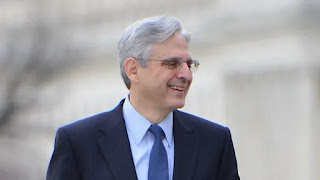With More Smoke And Mirrors About Hunter Biden Charging Decisions, DOJ Covers Up A Cover-Up
A top government official confirmed IRS whistleblower claims that the Justice Department hamstrung the investigation into Hunter Biden. But that same government official refused to acknowledge that Attorney General Merrick Garland and U.S. Attorney David Weiss misled Congress with their claims that Weiss had ultimate authority over the investigation.
That Weiss and the Department of Justice are standing by that story is reason enough for the House to stop deferring to the Justice Department’s “ongoing investigation” excuse for withholding information from Congress. Oversight Committees should start issuing and enforcing subpoenas to expose the DOJ’s cover-up of Biden-family corruption — and its cover-up of the cover-up.
The House Judiciary Committee’s spree of transcribed interviews over the last few weeks continues to reveal new details concerning the DOJ and FBI’s obstruction of the investigation into Hunter Biden and Biden-family corruption. The recent questioning of the DOJ’s top dog for the criminal division of the tax division, Stuart Goldberg, added new texture to the previous testimony by IRS whistleblowers — confirming their many complaints about the Justice Department’s interference in their investigation.
The tax division of Main Justice, Goldberg explained during his interview, is responsible in investigations of tax crimes to decide whether to open a grand jury investigation and whether to authorize the prosecution of tax offenses. Goldberg further clarified that certain investigative steps, such as approving attorney subpoenas, require the sign-off of the tax division of Main Justice. Beyond the normal approval required by Main Justice in tax cases, Goldberg testified that in sensitive matters, such as the Hunter Biden case, there would typically be “closer supervision” of the investigation by the tax division, including authorization at a higher level than normal.
Not only did Main Justice, through the tax division, have authority over approving certain investigative steps, but Goldberg testified to the House Judiciary Committee that the tax division’s approval was required before a U.S. attorney’s office could bring felony tax charges. The tax division would even approve which specific charges could be brought, according to Goldberg.
When pushed on what happens if the tax division refused to approve charges, Goldberg told the House Judiciary Committee that the U.S. attorney’s office could “appeal” to the deputy attorney general who would then resolve the dispute. However, when Judiciary Committee Chair Jim Jordan asked how often that happened, Goldberg said only once in the last three years.
This backdrop coincides perfectly with what IRS whistleblowers previously told Congress. They testified that they needed approval from D.C. before they could take various investigative steps and that Delaware U.S. Attorney Weiss had said he was not the final decision-maker when it came to Hunter Biden.
However, when pushed to confirm those claims — and, specifically, whether the DOJ tax division had authorized criminal felony charges against Hunter Biden in 2022 — the DOJ lawyer representing Goldberg directed him not to answer that question. With that line of questioning closed down, the House Judiciary Committee pivoted to a more general inquiry: “Between DOJ Tax and the U.S. Attorney’s Office in Delaware, who would you say is the primary decisionmaker on this case with regard to the tax component?”
And here the dizzying spin began in force. “So from my perspective, David Weiss in the U.S. Attorney’s Office was leading the case and running the case and were doing that and that Tax Division had responsibilities under the Justice Department procedures and policies to review certain things and approve certain things, yes,” the tax division chief responded. And if there was “any disagreement or difference of opinion as to certain perspectives,” Goldberg explained, “then it would have to be decided by somebody else in higher authority.”
While Goldberg’s explanation mirrored what the IRS whistleblowers claimed — that Weiss was not the ultimate decision-maker — Goldberg refused to acknowledge the obvious when confronted with Weiss’s letter in which the Delaware U.S. attorney claimed he was the ultimate decision-maker.
“So the Tax Division has responsibility to authorize cases or not authorize cases. That’s what we’re required to do under the Department’s policies,” Goldberg noted. Then, to justify Weiss’s statement that he was the ultimate decision-maker, Goldberg testified, “[M]y recollection is that David Weiss in his letter qualified or recognized that” his “ultimate authority” was only such authority as was “consistent with” “Department’s rules, the Federal rules[,] the Federal Principles [—] Principles of Federal Prosecution, other departmental policies.”
Goldberg took a similar tack when questioned about Garland’s statement that “Mr. Weiss had, as I said from the beginning[,] at the very beginning[,] that he had authority over all matters that pertain to Hunter Biden.”
“I do believe that the Attorney General in his statements is implicitly saying that [—] when he says people have full authority[,] it’s to conduct their work subject to the standard policies and rules of the Department of Justice, unless the Attorney General specifically disagrees with that,” Goldberg told the Judiciary Committee.
Goldberg’s crafty caveat might provide Weiss and Garland cover, but to Americans, the entire spectacle reeks of a cover-up. And it is — a cover-up of a cover-up.





Post a Comment